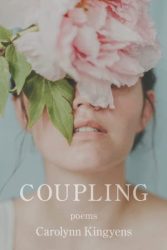Poetry Review: Carolynn Kingyens’s “Coupling” — Art as a Means of Survival
By Ed Meek
In this collection, Carolynn Kingyens discloses what lies behind the veneer of our relationships.
Coupling by Carolynn Kingyens. Kelsay Books, 68 pages, $16.50.
 Art is a survival tool. It helps us make meaning of our lives by providing us with aesthetic pleasure, much as the beauty of nature does. The mainstream media titillates us with disconnected, mostly fragmented negative narratives. The language of art peels back the curtain of confusion and shows us the wizard, for better or worse. Coupling, Carolynn Kingyens’s second book of poems, goes about disclosing what lies behind the veneer of our relationships. She draws from her past and invites us to share revelations that are both humorous and troubling.
Art is a survival tool. It helps us make meaning of our lives by providing us with aesthetic pleasure, much as the beauty of nature does. The mainstream media titillates us with disconnected, mostly fragmented negative narratives. The language of art peels back the curtain of confusion and shows us the wizard, for better or worse. Coupling, Carolynn Kingyens’s second book of poems, goes about disclosing what lies behind the veneer of our relationships. She draws from her past and invites us to share revelations that are both humorous and troubling.
Kingyens is particularly good at dramatizing paradoxes we cling to in everyday life. We are influenced by the beliefs we grew up with — even when we no longer entirely believe them.
“Each chore/around your house–/a station of the cross:/that’s how far gone I was/that’s how good you were/in bed.” Like Lena Dunham in the series Girls, the narrator of Kingyens’s poems finds herself stuck in relationships that she’s both surprised and appalled by.
In “Alone Now” Kingyens invites us to
Imagine
for a moment
being trapped
on a long flight
to Tibet;
a kind stranger
in the seat beside you–
who never shuts up.
By the fifth hour,
your neck begins
to hurt from all
the nodding.
Readers will no doubt nod along in amused agreement, while having to acknowledge at the same time that it’s true — these situations drive us crazy. And the weird part is they happen to all of us all the time.
A few stanzas later she says:
Imagine,
for a moment,
your head
in your hands.
The serious turn in the poem is so emotionally effective because the horror was prefaced by humor. She suggests that we live lives filled with tragicomedy.
Kingyens comment on marriage partakes of that clear-eyed vision:
No one warns you
about the movement
in marriage,
that slow-motion drift
toward indifference
“Write about the things that bother you. The experiences that don’t go away,” poet Richard Hugo once said. Kingyens tells us about a friend who remains in her thoughts.
Jimmy Russo told me
six months
before he jumped off
the George Washington Bridge
that my problem was
I didn’t know myself;
that … and I talked too much.
Kingyens taps into how we remember odd details about friends who are no longer with us.
In the title poem, “Coupling,” Kingyens contrasts the story her husband tells others about how they met with the real story. She hones in on how we present better versions of ourselves and our relationships to others. We hide the self that exists beneath the reassuring social facade. You need to do no more than check out all the testifying that takes place on Facebook around anniversaries.
Your version of events
were tidy and clean,
When you said
you knew I was the woman
you were destined to marry
the moment you saw me…
But the truth was:
you had no interest
in wanting to marry me
the day I showed up
in your messy doorway…
I was ripe, hot,
willing to please—
not the bitch
you would later marry.
One of Kingyens’s strengths is her ability to view with skepticism her religious upbringing. Here is her experience of “Vacation Bible School”:
We sang songs
at Vacation Bible School
about how Jesus
loved the little children
of the world…
All of us, soldiers for Christ.
We drank Jim Jones-colored
punch and ate no frills
butter cookies…
The Jim Jones reference emphasizes the cult-like atmosphere. As children, many of us believed these myths. Kingyens then shocks us with how some of her Bible schoolmates turned out:
Years later, Timmy Ainsley
would shoot himself
in the mouth
after he came out
to his parents…
And I heard little Regina
Hopely, Bethel’s Christmas
Pageant Mary,
became a meth addict…
Taking a poetic approach similar to that of Hugo, Joseph Lawrence, and Doug Holder, Kingyens zeroes in on stories and experiences that stick with her. She shares them with us, prompting us to take a closer — perhaps braver — look at our own lives and relationships. Her poems are rife with the contradictions we all live with; she reminds us that we need good poetry to make sense of our lives.
Ed Meek is the author of High Tide (poems) and Luck (short stories).

Great review. Liked the lines from poems so I could really understand the point being made by reviewer (Ed Meeks). Loved the spareness and ‘right on ‘ jab of the words. Made me definitely want to read the book!
I agree, great review by Ed Meek.
Just the right amount of words taken from the book to have me very interested in this wonderful truthful book